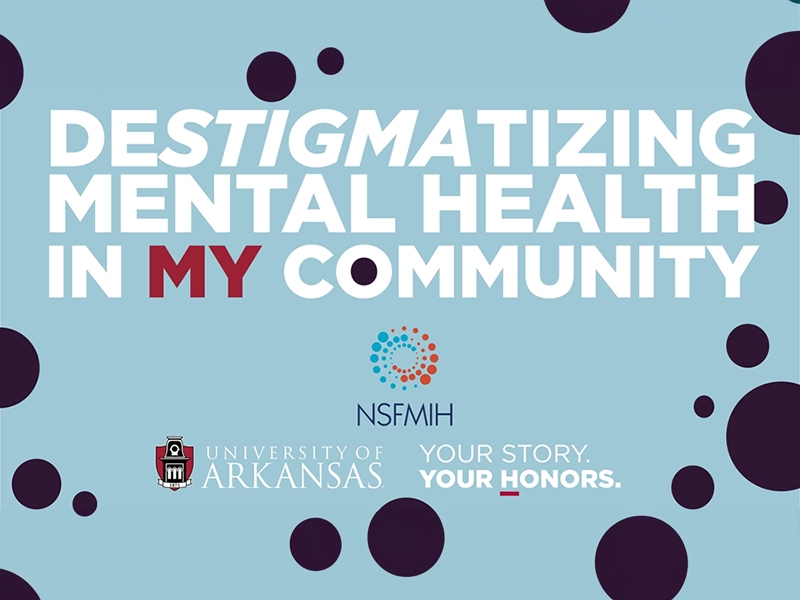As part of the National Society for Minorities in Honors Conference, the Honors College will host "Destigmatizing Mental Health in My Community," a panel discussion focused on the mental health of students from underrepresented backgrounds. All on campus are invited to attend the session from 5-6 p.m. on Wednesday, Oct. 25, in Gearhart Hall Auditorium (GEAR 26).
The panel will discuss the stigma surrounding mental health struggles and highlight the pressures faced by high-achieving students from minority communities. Panelists will also examine how to support students seeking resources, as well as how colleges and universities can meet their mental health needs.
"I want to validate and acknowledge the person labeled as 'too sensitive' for setting boundaries or speaking up in their environments," noted panelist Lia Childress, a mental health therapist and graduate of the U of A with a Master of Science in clinical psychology. "My goal for this event is to highlight how to have these conversations and with who about when it comes to mental health because both are so important to finding the right type of support!"
Panelists for the session include:
-
Dr. Carlos Acosta, Pat Walker Health Center, U of A
-
Lia Childress, M.S., Chenal Family Therapy
-
Xavier Smith, career counselor for Fulbright College of Arts and Sciences & Honors College alum
-
Kymara Seals, Dre Seals Outreach Project
-
Alejandro Ruiz, M.S., University of Florida, Counseling and Wellness Center
Georgeanna N. Wright, director of University Honors and assistant professor of health informatics and health information management at Arkansas Tech University, will moderate the discussion. She is excited about the opportunity to bring broader awareness to mental health struggles in underrepresented communities.
"I'm looking forward to a robust discussion on a topic that too often is overlooked — and we have a fantastic panel who will speak with authority and authenticity," Wright said. "I am anticipating 'FARE-WELL': Focus, Awareness, Recognition, Engagement, providing Well-being, that is Essential, with Love and Legitimacy."
The panel serves as the opening event for the National Society for Minorities in Honors Conference being hosted on the U of A campus Oct. 25-27. The conference will focus on defining the value of an honors education, evaluating success metrics and creating a welcoming and inclusive honors experience for all. Additional events include panels, workshops and roundtable discussions that aim to provide examples of how programs or colleges are engaged in this work and presentations that challenge institutional boundaries.
The National Society for Minorities in Honors was founded in 2015 to bring together and advance discussions and action in relation to diversity, equity and inclusion in honors education.
Find more information and register for the conference here. If you have conference questions, contact Xochitl Delgado Solorzano, assistant dean at the Honors College.
About the Honors College: The University of Arkansas Honors College was established in 2002 and brings together high-achieving undergraduate students and the university's top professors to share transformative learning experiences. Each year the Honors College awards up to 90 freshman fellowships that provide $80,000 over four years, and more than $1 million in undergraduate research and study abroad grants. The Honors College is nationally recognized for the high caliber of students it admits and graduates. Honors students enjoy small, in-depth classes, and programs are offered in all disciplines, tailored to students' academic interests, with interdisciplinary collaborations encouraged. All Honors College graduates have engaged in mentored research.
About the University of Arkansas: As Arkansas' flagship institution, the U of A provides an internationally competitive education in more than 200 academic programs. Founded in 1871, the U of A contributes more than $2.2 billion to Arkansas' economy through the teaching of new knowledge and skills, entrepreneurship and job development, discovery through research and creative activity while also providing training for professional disciplines. The Carnegie Foundation classifies the U of A among the few U.S. colleges and universities with the highest level of research activity. U.S. News & World Report ranks the U of A among the top public universities in the nation. See how the U of A works to build a better world at Arkansas Research and Economic Development News.
Topics
Contacts
CD Eskilson, editor
Honors College
479-575-7678,
